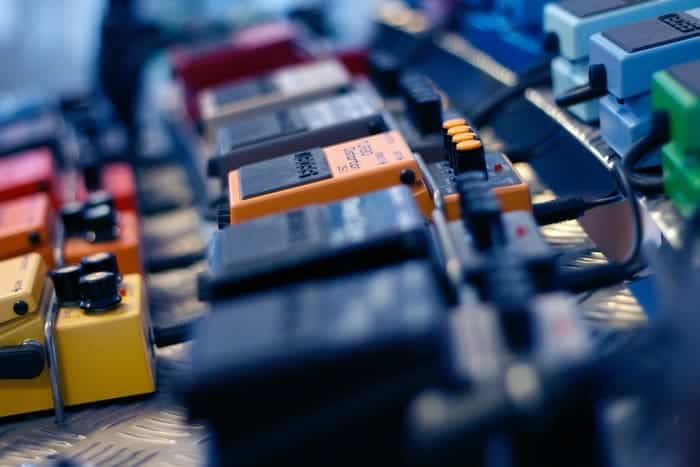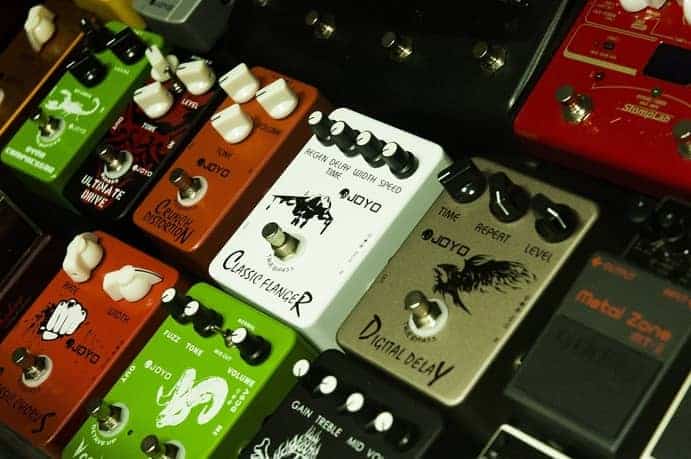
A question I am asked usually by beginners is “should I buy cheap guitar pedals or pay more for expensive pedals.”
And I must admit, this is a good question!
Is there really a big difference when it comes to tone, durability, and reliability?
My Short Answer…
Affordable pedals are mass-produced keeping the cost low but can lack reliability and build quality depending on the manufacturer. Expensive pedals are designed to offer the best sound available and can include more tonal variety at the expense of extra cost.
How to View Guitar Pedals
If my short answer will not do it for you. Another way to answer this question is to view guitar pedals as ‘tools’.
The reason tools exist is to get a job done! Cheap tools can certainly do a job perfectly fine depending on their use and application.
An expensive frying pan, for example, may last longer, disperse the heat slightly better, and be manufactured from better materials.
But that is not to say a cheap frying pan can still get the job done. It is a similar view when it comes to guitar pedals varying in price.
Here are some situations budget pedals can come in useful…
5 Uses for Cheap Guitar Pedals

Strictly Home Playing
If you are not a pro musician or a gigging guitarist and spend most of your playing in the bedroom.
Budget pedals are therefore a great purchase for noodling and experimenting at home. The simple reason is you do not require expensive gear to guarantee reliability if you are not a gigging guitarist in the first place.
Secondly, if you are a beginner, you haven’t trained your ear enough to know what gear sounds good, bad, or right for you, plus you have not developed your voice, style, and ‘identifiable sound’ yet to justify shelling out on expensive pedals.
Replacements and Backups
In my opinion, this is the main reason for purchasing inexpensive pedals. Picture the scene, you are playing a gig and your favorite overdrive pedal suddenly gives out for whatever reason (not uncommon.)
No problem! Swiftly replace it with the cheap overdrive pedal you luckily brought along, disaster avoided and your band’s performance is spared.
Best of all, budget pedals sound that good, the audience may not even notice the swap.
When playing a gig you bring spare: leads, picks, batteries, strings even a guitar, so definitely bring spare pedals if you have them.
The combination of having a pedal at home for bedroom playing and including it as a backup is one of the best reasons for purchasing.
Second Pedalboard
If you play in multiple bands, for example, pedalboard A is your rock set-up including distortion, overdrive, wah, and a boost pedal.
Pedalboard B is for your country band featuring compression, clean boost, reverb, and echo delay. The point is, affordable pedals sound great and are versatile that can be used for a variety of musical situations.
Another situation is creating a pedalboard specifically for practice and rehearsing. A second pedalboard can be your gigging pedalboard featuring the more expensive and valuable gear which can stay at home.
Experimenting with Sounds
If you feel like you want to break the norm and experiment with different sounds. For example, if you are a blues guitarist but want to experiment with ambient and swell tones, but do not want to pay a fortune doing so?
No problem, budget pedals are the perfect answer for producing the sounds you want to discover for endless noodling and tone experimentation.
Broadening your horizons in sound as a guitar player is always a good idea. To expand and develop your sound with different tones, budget pedals can be a stepping stone to helping you grow your sound musically as a guitarist.
Filling in For a Missing Sound
So you have crafted your perfect board consisting of your core sound, however, your tone is missing a splash of reverb or some chorus effect to enhance a clean section you play live.
Why spend $140 on a vintage reverb pedal with all the bells and whistles when you can spend as little as $30 for near enough the same sound?
Reverb and compression are typically ‘set it and forget it’ pedals which are typically the best affordable candidates to add to your rig. Meaning them expensive boutique pedals can stay on the shelf and save your wallet in the process.
Interestingly enough, many guitar pedal myths floating around the internet say that pedals can be dangerous for your amp. Well, I wrote a post about this topic. You can learn some of the common myths here!
Things to Know Before Buying
After using affordable pedals for so long I have had my fair share of experiences and know what to expect when it comes to the more affordable side of gear. Before lining your pedalboard with an array of budget pedals, here are the key things you must know before doing so.
Sound and Tone
This is the reason why budget pedals are awesome! Affordable pedals can offer a staple sound whether that’s ‘distortion’, ‘overdrive’, ‘delay’, ‘chorus’, ‘reverb’ etc all for the fraction of the price of an expensive pedal.
It’s very possible to assemble a small pedalboard for $100 with one pedal costing $20 which includes all the essential pedals needed for gigging.
Although it may not be wise to construct a gigging pedal board consisting of all super budget pedals which I will explain in a second, however, it can be done if need be!
Clone Pedals
Very popular these days are clone pedals which mimic iconic pedals visually and tonally. Some are very impressive and sound very close to the original for a fraction of the price.
Some clone pedals are very affordable and can be great alternatives to the original if you lack the budget. Some examples of these clones include:
- (Clone) ‘Demon Tube Screamer’/ ‘Joyo Tube screamer’ – Ibanez tube screamer (original)
- (Clone) ‘ENO Myomorpha’ / ‘Biyang DS-8 Mouse’ – ‘Pro Co Rat’ (original)
- (Clone) Mooer Blues Crab – Marshall blues breaker (original)
- (Clone) Biyang FZ-10 Fuzz Star – Electro-Harmonix Big Muff (original)
- (Clone) Mooer 90 – MXR Phase 90 (original)
Build Quality
Do not get carried away buying tons of cheap pedals if you are a frequent gigging guitarist. Keep in mind with the lower price tag a compromise has to be made somewhere.
Usually, this compromise comes in the form of build quality and manufacturing quality which impacts durability and reliability.
That is not to say all budget pedals have terrible build quality but with day in and day out use, you will notice where corners have been cut during the manufacturing process.
Examples include…
- Cheaper inputs
- Exposed circuitry near the battery compartment
- Cheaper components
- Electricity discharge
- Lower quality wiring
- Plastic housing
- Stiff pedal stomp
As a side note, do you prefer the tone of single-pedals? or the flexibility of multi-effects pedalboards? To learn the differences, You should check out my related post on the differences between single-pedals and multi-effects processors.
My Experience With Cheap Pedals
For example, my Behringer TU300 chromatic tuner pedal for example only cost $17 including shipping. Behringer is known for supplying a large range of highly affordable pedals with some of them actually sounding very good.
At the time I needed an affordable tuner so took the plunge. However, being one of the cheapest tuner pedals money can buy, on unboxing you will notice if you have ever owned a Behringer pedal.
The plastic housing, the stiff stomp pedal and no hexagonal nuts on the input and output jacks. there is also more evidence of cost-cutting when awkwardly replacing the battery.

Instead of installing the battery on the back like most pedals, you awkwardly remove the front case which exposes an unattached spring and exposed wires for the battery connection.
When reassembling the front case you have to line up the spring and the brackets on the pin using a pen or screwdriver which is fiddly and awkward. It also feels like you are going to break the plastic hinge on the front case when reattaching.
This is not the case with all affordable pedals, just an example of my experience with super budget pedals with Behringer being a good example. Just keep in mind you may have similar issues when it comes to budget gear the trick is to always do your research before buying.
Reliability?
Depending on where you get your pedals from, I have heard the odd horror story of a budget pedal being bust straight out the box but I have also owned pedals that have lasted for years without any problems.
It is difficult to say because some are built like tanks and some can be flimsy straight out the box, but having a reliable arsenal of pedals is crucial for withstanding the heavy pounding that comes with gigging.
With dirt-cheap pedals you never know when they are going to give out, so all you can do is inspect the build quality and read reviews from other owners before using them for a gig.
Wise Gigging with a $15 pedal?
Going back to my Behringer pedal example, I once gigged with this tuner pedal and for some reason, it was not responding very well during true bypass meaning it took much longer than usual to tune-up.
I should have taken the cheap and poor build quality as a hint and never used it for a gig as I’m pretty certain after constant heavy use would have eventually broken the front chassis.
Leaving me high and dry without a tuner onstage. This comes with the territory with more affordable pedals so after the gig I quickly retired it for home use and reinstated it as a backup.
What about Re-sell Value?
Pedals that are more expensive and more recognized in the industry such as the ‘Ibanez Tube Screamer’, ‘Dunlop Fuzz Face’, ‘Dunlop Cry Baby Wah’ to give a few examples, have a higher resale value and are more likely to hold their price if you were to sell them on.
The reliability, reputation, and popularity of these established pedals also mean you can get a decent return if you were to sell due to their popularity and demand.
cheap pedals, however, do not hold their value as well as the more established and boutique category which makes sense for a few reasons.
The first is there’s no point risking buying a second-hand budget pedal for $15 when you could buy it new for $25. Meaning that before buying a budget pedal means you will be stuck with it or sell it for much less than you paid for it.
Where to Buy Budget Pedals?
A golden rule, especially with cheap guitar pedals, is to always purchase from an established and reliable retailer such as: ‘Guitar Center’, ‘Reverb’, ‘Musicians Friend’, ‘Sweetwater’, ‘Amazon, etc.’
The reason being these companies have a solid returns policy and full customer service support.
If you were to receive a dud pedal from these brands, there is a high chance you will receive a full refund on a return as these retailers are highly concerned with your user experience when purchasing their products.
These companies are also more likely to have a high standard of quality control and more likely to check and test second-hand gear for full working use before delivering to buyers.
What about EBay?
Buying cheap pedals from eBay is something I have done in the past, luckily without any issues. I agree it is tempting to purchase second-hand gear from independent sellers for much less than the retailers.
You must keep in mind, there is always the risk you could receive a product not up to standard so always check the buyer’s feedback score.
Even worse is that eBay will not take responsibility for items, so disputes must be handled between you and the seller which is a hassle we could all do without. That is not to say eBay is not a good place to buy cheap pedals, just to be aware these are the risks you need to know before purchasing second-hand gear.
Do Not Buy from China!
It goes without saying but it still needs to be said anyway… DO NOT buy gear directly from China, I’ve heard multiple horror stories from users online with shipments from the South East.
All I’m going to say is you run a high risk of receiving a dud product from China without a returns policy or any good standard of customer service so stay clear of this one.
Best Affordable Pedal Brands
So after discussing all the above details about budget pedals, to avoid running into any of these issues means purchasing from companies that have a reputation for A (solid build quality) B (budget price), and C (great tone).
Here is a list of pedal companies that are known for producing some killer budget pedals that meet all the criteria. I would highly recommend these companies when looking to craft a budget pedalboard.
- Joyo
- TC Electronic
- Tone city
- Mooer
- Donner
- Boss
(Have I missed any? Add some in the comments that need to be added to the list)
Do you want to know how to connect your pedals to your PC for recording? Then check out my guide to connecting your pedals to an audio interface. You can read my post here!
Did You know?
Did you know that pedals that are mass-produced are generally more reliable than handmade boutique pedals? Why is this?
The reason is that mass-produced pedals have a higher level of quality control with these pedal companies being highly concerned with the efficiency and accuracy of their production line aiming for a defect rate of little as 1%.
Boutique pedal makers do not want you to know this but handmade pedals have the age-old crutch of human error to contend with, meaning that handmade pedals are more likely to break due to a poorly soldiered component for example.
My Opinion
Personally, I believe affordable pedals are awesome and recommend them for a number of reasons. Budget pedals can certainly deliver and can 100% be used to create a core sound on your pedalboard.
The only difference is that super-budget pedals may not be as durable and resist a heavy gigging schedule as an expensively priced pedal.
An expensive distortion pedal may have more clarity and a brighter sound, however, other guitarists may prefer the darker tone of the cheaper option. At the end of the day, it all comes down to personal preference.
On the other hand, if there’s a mystical boutique pedal made from the heavens that hold the key to your perfect sound which no other pedal can deliver, obviously it makes sense to break the bank to add it to your collection.
Final Thoughts
When it comes to buying budget vs expensive gear, remember as we discussed, they are tools to your tone! Hopefully, this article has shed some light on my thoughts on cheap pedals vs expensive pedals, to help you make an informed decision. Peace Out!
If you liked this post, I have a related article all about pedal distortion vs amp distortion. Understand the differences in tone and dynamics. You can read this post here
